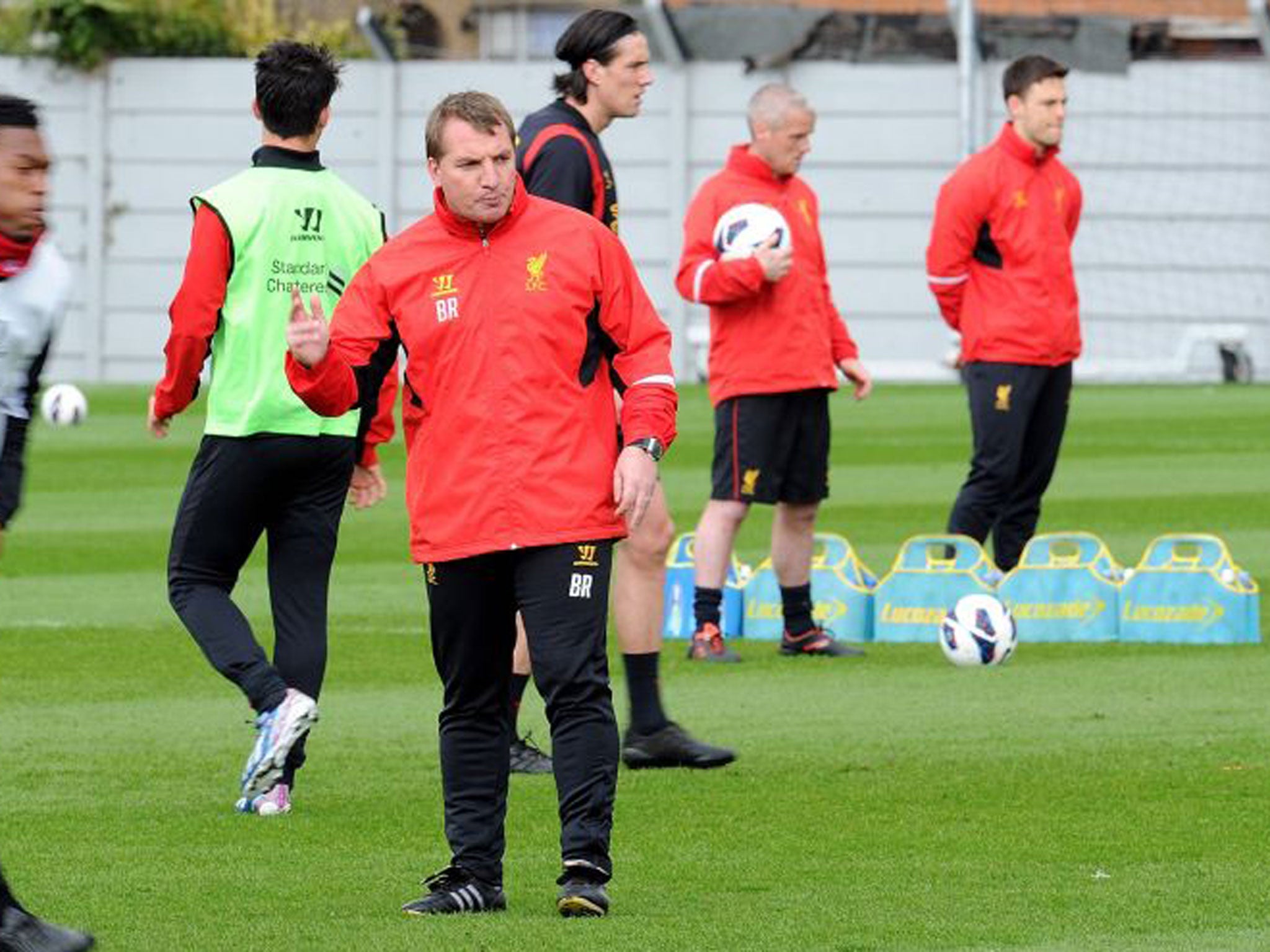Luis Suarez bite: How Brendan Rodgers tried everything in his bid to win sympathy for the Liverpool striker
Manager tasked with defending a valuable asset and avoiding Kenny Dalglish errors

"This looks serious," said Brendan Rodgers with the weary humour of a condemned man catching a first glimpse of the gallows.
In front of him was a line of eight television cameras. The week before, journalists who gathered regularly in the press room at Liverpool's training ground were complaining that it was becoming increasingly difficult to get the club in the paper. The season was fizzling out on Merseyside. No longer. The bite Luis Suarez had given Branislav Ivanovic has seen to that.
It was serious. In the immediate aftermath of the incident, the most damning condemnation of Suarez had come from Graeme Souness, who when winning three European Cups with Liverpool showed he knew how to dish out the rough stuff. Souness had argued that one of the victims of the fallout might be Rodgers himself.
The aggressive, almost pointedly rude way in which Kenny Dalglish had forlornly defended Suarez against charges of racially abusing Manchester United's Patrice Evra last season had played badly with the club's American owners. "I know Kenny as well as anyone," Souness had said. "He backed Suarez right up to the hilt, who knows how much that contributed to Kenny not being here any more? This man [Rodgers] is going to have to do the exact same thing."
Liverpool's chairman Tom Werner had spoken to club executives on Sunday evening immediately after the incident and had largely left matters in the hands of the managing director, Ian Ayre. However, even in Werner's home city of Boston, Suarez was news. CNN described him as: "Hated by the English Premier League champions, chastened by the UK's Prime Minister and even lampooned by a pizza company – is Luis Suarez the No 1 enemy to English football?" Had Suarez kept his teeth to himself, Ayre would be in Australia organising a tour to promote "the Liverpool brand", an irony that was lost on nobody.
Rodgers' task was to defend Liverpool's most valuable asset, hold the club line that a 10-game ban was a cruel and unusual punishment without sounding as if he was gripped by paranoia, something not always achieved by his predecessor. Dalglish may have been warm and funny once the lights of the television cameras were switched off, but he had no interest in playing the media game and suffered for it.
Sir Alex Ferguson, a decade older, who outmanoeuvred him during the Evra affair, is altogether cuter. When it seemed Wayne Rooney was on the point of walking out of Old Trafford, Ferguson gave a Champions League press conference.
Like at Melwood, it was a grand, set-piece occasion, where nobody would ask about the match it was held to publicise. Ferguson played it beautifully. He appeared hurt, bewildered and betrayed, like a father abandoned by his son. Privately, he was probably scathing about Rooney's agent, Paul Stretford, but his performance helped shift the tide of debate firmly towards the Manchester United manager.
Rodgers would make a good preacher. He speaks in the resonant tones of an Ulster priest. He had done his research, tracking down a biting incident from a game between Stockport and Chester that led to a five-game ban and he reminded his audience of where Suarez had come from. The streets of Montevideo are unforgiving, especially when you are an incomer from the far west of Uruguay and are being brought up by a lone parent with six brothers.
"He has grown up in a country and environment where everything is about survival," Rodgers said. "People like him have been brought up to fight for their lives and win."
Simply banning him for 10 games would, Rodgers argued, do nothing to address that. Sessions with the renowned sports psychologist, Steve Peters, who is on Liverpool's payroll and who has worked effectively to curb Craig Bellamy's irrational explosions of anger, might.
However, if Rodgers and Liverpool were shocked by the length of Suarez's ban, they were betraying naïvety. Phil Thompson, who has been at the heart of the club since being part of the Anfield crowd during their epic European Cup semi-final with Internazionale in 1965, predicted "a 10-game ban at least".
On Twitter, their European Cup winning midfielder Dietmar Hamann wrote: "Suarez was always going to get six games-plus. Would it not have sent out a stronger message if the club suspended him for two weeks to show him and everybody else who plays for the club in the future what LFC is all about?"
Liverpool never considered their own ban and Rodgers admitted he had not considered any comparisons between the Suarez incident and the Eric Cantona affair. And yet both were high-profile figures who were seen to be punished not just for an outrageous piece of behaviour but for who they were. Cantona was in 1995 depicted not as the epitome of United's style but as a bully and a thug. Suarez, to quote CNN, is the "enemy of the English game".
Just as Rodgers offered Suarez psychological help, so Ferguson wondered if low blood sugar could be the cause of Cantona's excesses as all the incidents involving him came in the second half.
Cantona seriously considered quitting not just the country but the game itself. Rodgers has acknowledged Suarez will be tempted by the offer of an easier life away from Anfield. Cantona emerged a different, changed man. With Suarez nobody is quite sure.
Subscribe to Independent Premium to bookmark this article
Want to bookmark your favourite articles and stories to read or reference later? Start your Independent Premium subscription today.

Join our commenting forum
Join thought-provoking conversations, follow other Independent readers and see their replies